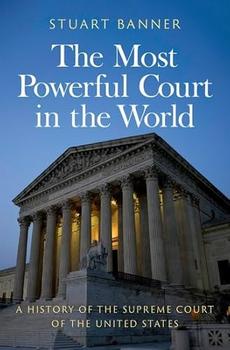
A History of the Supreme Court of the United States
by Stuart Banner
An authoritative, even-handed, and accessible history of the Supreme Court of the United States, the most powerful court in the world and the final arbiter of the world's oldest constitution.
Will abortion be legal? Should people of the same sex be allowed to marry? May colleges prefer black applicants over white ones? These are among the most bitterly contested issues in the United States today. We answer these questions, and many more, by presenting them to nine lawyers--the justices of the Supreme Court of the United States. No other nation commits so many important questions to its highest court.
Stuart Banner's The Most Powerful Court in the World is an authoritative history of the United States Supreme Court from the Founding era to the present. Not merely a history of the Court's opinions and jurisprudence, it is also a rich account of the Court in the broadest sense--of the sorts of people who become justices and the methods by which they are chosen, of how the Court does its work, and of its relationship with other branches of government. It is about how the Court acquired so much power, how it has retained its power in the face of repeated challenges and criticisms, and what it has done with its power over the years. Rather than praising or criticizing the Court's decisions, Banner makes the case that one cannot fully understand the decisions without knowing about the institution that produced them.
Offering a fresh analytical window into today's contentious debates about the Court--debates that often rest on dubious ideas about the Court's history—The Most Powerful Court in the World helps readers see cases through the justices' eyes.
"Accessible, intelligent, and colorful ... With clear-minded authority, Banner tells the story of a crucial, but misunderstood, part of the constitutional structure." —Kirkus Reviews (starred review)
"Stuart Banner's book is a study of the court that situates this institution firmly in both its social and human context. It is also, in my opinion, the most interesting, the most readable, and the most insightful history of the court yet produced. Congratulations goes to Stuart Banner for this tremendous achievement." —Lawrence Friedman, Marion Rice Kirkwood Professor of Law, Emeritus, Stanford Law School
"This masterful synthesis manages to be at once erudite, engrossing, enlightening, and entertaining. It is a must-read for anyone interested in the history of the Court and its relationship to American society and politics." —Laura Kalman, Distinguished Research Professor of History, University of California, Santa Barbara
This information about The Most Powerful Court in the World was first featured
in "The BookBrowse Review" - BookBrowse's membership magazine, and in our weekly "Publishing This Week" newsletter. Publication information is for the USA, and (unless stated otherwise) represents the first print edition. The reviews are necessarily limited to those that were available to us ahead of publication. If you are the publisher or author and feel that they do not properly reflect the range of media opinion now available, send us a message with the mainstream reviews that you would like to see added.
Any "Author Information" displayed below reflects the author's biography at the time this particular book was published.
Stuart Banner is the Norman Abrams Distinguished Professor of Law at the University of California, Los Angeles. He is the author of several books about the history of the American legal system, including How the Indians Lost Their Land; The Death Penalty; The Decline of Natural Law; Speculation; The Baseball Trust; and American Property.






At times, our own light goes out, and is rekindled by a spark from another person.
Click Here to find out who said this, as well as discovering other famous literary quotes!
Your guide toexceptional books
BookBrowse seeks out and recommends the best in contemporary fiction and nonfiction—books that not only engage and entertain but also deepen our understanding of ourselves and the world around us.